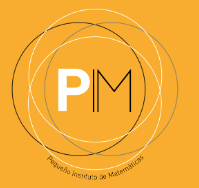Investigación
Noticias Destacadas
 Agenda del Departamento Agenda del Departamento |
- Información (provisional) sobre grupos y horarios de las asignaturas impartidas por el Departamento de Matemáticas, para el curso 2023-2024.
- Propuestas de Trabajos de Fin de Grado para el curso 2023-2024.
|
Canal @matematicasuamEnlace al canal del Departamento en youtube. |
PIM (Pequeño Instituto de Matemáticas)Con el objetivo de fomentar el interés por las matemáticas y dirigido a jóvenes entre 14 y 18 años, nace este proyecto de Instituto de Ciencias Matemáticas (ICMAT) en colaboración con nuestro Departamento, la Universidad Autónoma de Madrid y la Real Sociedad Matemática Española. El proyecto comienzó en el curso académico 2022-2023. Ampliar información en su página web. |
“Online Analysis and PDE” seminar will take place Wednesday November 16th at 15:00h.
Speaker: Susanna Terracini, Dipartimento di Matemática "Giuseppe Peano". Università di Torino
Title: Higher order boundary Harnack principle on nodal domains via degenerate equations
Abstract: The ratio v/u of two solutions to a second order elliptic equation in divergence form solves a degenerate elliptic equation if u and v share the zero set; that is, Z(u) ⊆ Z(v). The coefficients of the degenerate equation vanish on the nodal set as u^2. Developing a Schauder theory for such equations, we prove C^{k,α}-regularity of the ratio from one side of the regular part of the nodal set in the spirit of the higher order boundary Harnack principle established by De Silva and Savin in [4]. Then, by a gluing lemma, the estimates extend across the regular part of the nodal set. Eventually, using conformal mapping in dimension n = 2, we provide local gradient estimates for the ratio which hold also across the singular part of the nodal set and depends on the highest value attained by the Almgren frequency function.
References
[1] S. Terracini, G. Tortone and S. Vita, Higher order boundary Harnack prin- ciple on nodal domains via degenerate equations, preprint, 2022.
[2] Y. Sire, S. Terracini, S. Vita. Liouville type theorems and regularity of solutions to degenerate or singular problems part I: even solutions. Comm. Partial Differential Equations, 46-2 (2021), 310-361.
[3] Y. Sire, S. Terracini, S. Vita. Liouville type theorems and regularity of solutions to degenerate or singular problems part II: odd solutions. Math- ematics in Engineering, 3-1 (2021), 1-50.
[4] D. De Silva, O. Savin. A note on higher regularity boundary Harnack in- equality. DCDS-A, 35(12), (2015) 6155-6163.
Please, visit our SITE OF THE SEMINAR for more information on the next seminars, organizers, etc..






